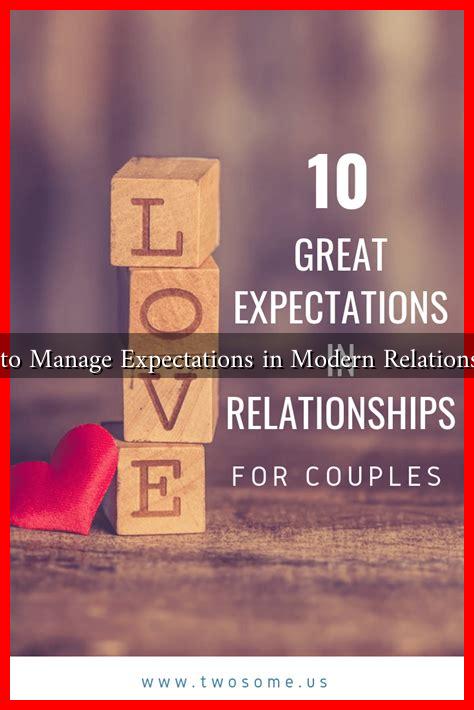-
Table of Contents
How to Manage Expectations in Modern Relationships
In today’s fast-paced world, relationships are often complicated by a myriad of factors, including technology, social media, and shifting societal norms. Managing expectations in modern relationships is crucial for fostering healthy connections and ensuring mutual satisfaction. This article explores effective strategies for managing expectations, supported by research and real-life examples.
Understanding Expectations in Relationships
Expectations in relationships can be defined as the beliefs or assumptions we hold about how our partner should behave, what they should provide, and how the relationship should progress. These expectations can stem from personal experiences, cultural backgrounds, and societal influences. Understanding the nature of these expectations is the first step toward managing them effectively.
The Impact of Unrealistic Expectations
Unrealistic expectations can lead to disappointment, resentment, and conflict. According to a study published in the Journal of Social and Personal Relationships, individuals who hold unrealistic expectations are more likely to experience dissatisfaction in their relationships. Here are some common unrealistic expectations:
- Believing that your partner should fulfill all your emotional needs.
- Expecting constant communication and availability.
- Assuming that love alone is enough to sustain a relationship.
Strategies for Managing Expectations
Managing expectations requires open communication, self-awareness, and a willingness to adapt. Here are some effective strategies:
1. Open Communication
Clear and honest communication is the cornerstone of any healthy relationship. Discuss your expectations with your partner early on to avoid misunderstandings later. Consider the following tips:
- Schedule regular check-ins to discuss feelings and expectations.
- Use “I” statements to express your needs without placing blame (e.g., “I feel neglected when we don’t spend time together”).
- Encourage your partner to share their expectations as well.
2. Set Realistic Goals
Setting achievable goals can help align your expectations with reality. Consider the following:
- Recognize that no one is perfect, including yourself and your partner.
- Focus on what you can control, such as your own actions and responses.
- Be willing to compromise and adapt your expectations as the relationship evolves.
3. Practice Empathy
Understanding your partner’s perspective can help you manage your expectations. Empathy allows you to appreciate their feelings and experiences, fostering a deeper connection. Here are some ways to practice empathy:
- Listen actively when your partner shares their thoughts and feelings.
- Validate their emotions, even if you don’t agree with their viewpoint.
- Put yourself in their shoes to understand their actions and decisions.
Case Studies and Real-Life Examples
Consider the case of Sarah and Tom, a couple who struggled with differing expectations regarding their social lives. Sarah valued spending time with friends, while Tom preferred quiet evenings at home. After several arguments, they decided to have an open conversation about their needs. They agreed to compromise by alternating between social outings and quiet nights, which ultimately strengthened their relationship.
Another example is the rise of online dating, which has transformed how people form relationships. A survey by Pew Research Center found that 30% of U.S. adults have used a dating site or app. This shift has led to new expectations regarding communication and commitment. Couples who openly discuss their dating experiences and expectations are more likely to navigate these challenges successfully.
Conclusion
Managing expectations in modern relationships is essential for building strong, healthy connections. By fostering open communication, setting realistic goals, and practicing empathy, couples can navigate the complexities of modern love. Remember that relationships require ongoing effort and adaptation. By being proactive in managing expectations, you can create a fulfilling partnership that stands the test of time.
For further reading on relationship dynamics, consider exploring resources from the American Psychological Association at apa.org.


